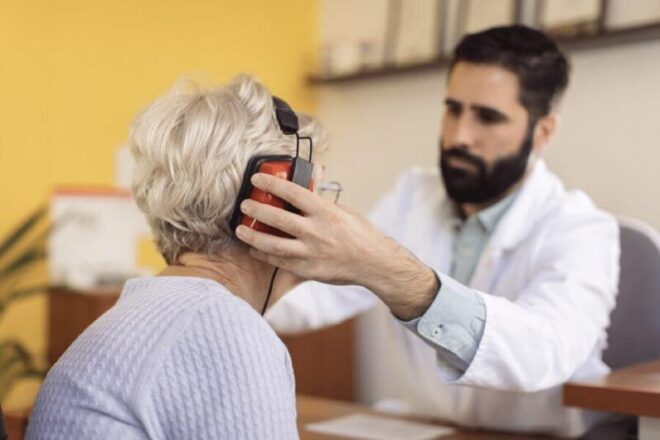A Comprehensive Guide to Muffled Hearing Loss in One Ear
Imagine a world where every sound comes through crisp and clear. Now, picture the challenge when your left or right ear suddenly feels clogged and muffled, turning this clarity into a frustrating haze of sound. When muffled hearing in one ear strikes without pain or warning, the questions begin to mount. Why is my hearing muffled? Could it be an ear infection or perhaps a buildup of earwax?
These perplexing issues can disrupt one’s ease in social situations and may even signal something more serious, like a sinus infection or tinnitus. Let’s explore the various root causes of sudden muffled hearing in one ear so you can understand the symptoms, find effective treatment options, and regain the ability to hear all the sounds that life has to offer.
Clearing the Fog on Unilateral Hearing Loss
Muffled hearing loss in one ear, or unilateral hearing loss, can resemble a constant or intermittent sensation as if your ear is plugged. It can affect individuals of all ages, from children to seniors, and the onset may be gradual or sudden. Studies indicate that approximately 1 in 1,000 children are born with unilateral hearing loss; for adults, the prevalence increases with age, especially beyond 60 years. Sudden or progressive, unilateral hearing loss shouldn’t be overlooked, as it may impact one’s ability to localize sound, understanding speech in noisy environments, and overall quality of life.
Root Causes of Muffled Hearing in One Ear
Identifying the common causes of unilateral hearing loss is crucial for effective treatment and management. While some causes may seem obvious, others might be less apparent, contributing to the complexity of diagnosing muffled hearing in a single ear. Below are the primary conditions and factors that could be affecting your auditory health:
- Earwax Buildup – Excessive earwax accumulation can block the ear canal, leading to muffled sounds.
- Ear Infections – Infections can cause inflammation and fluid buildup, altering hearing capacity.
- Sinus Infections – Congestion linked to sinus problems might affect auditory pathways, especially in one ear.
- Tinnitus – Commonly known as ringing in the ear, tinnitus can accompany a muffled hearing sensation.
- Eustachian Tube Dysfunction – When this tube is blocked, it can create pressure and muffled hearing.
- Sudden Sensorineural Hearing Loss (SSHL) – A rapid loss of hearing that occurs suddenly can be serious and requires immediate medical attention.
Spot the Symptoms & Understand the Risk Factors
Recognizing symptoms early is key to addressing muffled hearing loss effectively. It often starts with a lack of clarity in sounds or the perception that one’s ear feels full or obstructed. A person might notice difficulty in understanding spoken words, especially when background noise is present.
Risk factors such as exposure to loud noises, head trauma, or a history of ear infections can increase the likelihood of experiencing unilateral hearing impairment. It’s essential to pay attention to these warning signs and risk elements and seek evaluation at a hearing care center promptly.
Diagnosing Unilateral Hearing Issues
When one ear begins to fail in clarity, diagnosing the cause is the first step toward a solution. A thorough evaluation by a hearing specialist often includes a physical examination of the ear, hearing tests such as audiometry, and perhaps imaging like an MRI or CT scan to rule out structural causes. These diagnostic tools help pinpoint the exact nature of the hearing loss, whether due to earwax, infection, or a more complex condition such as nerve damage or Eustachian tube dysfunction. Early diagnosis ensures prompt and appropriate treatment to restore auditory health.
Treatment Options for Unilateral Hearing Loss
A tailored approach is key when treating muffled hearing. After diagnosis, treatment options may include the removal of earwax, medication for infections, or hearing aids for chronic conditions. Our centers provide advanced hearing aid technology, ensuring the ultimate comfort and ease of use.
In more severe cases, such as SSHL, prompt medical intervention like steroids may be necessary. Each patient receives personalized care, from in-home trials of hearing aids to ongoing support, optimizing your hearing experience and ensuring the highest quality of life.
Shielding Your Ears – Prevention Tips & Tactics
Prevention is vital when it comes to unilateral muffled hearing. You can protect your ears and preserve hearing quality by adopting several strategies. Begin with safeguarding against loud noises, an often-underestimated cause of hearing damage. Use earplugs or noise-canceling headphones in noisy environments and keep the volume at a safe level when using personal audio devices.
Regular checkups play a role in the early detection of potential issues, helping you stay ahead of complications. Avoiding inserting objects into your ears and maintaining good ear hygiene can prevent earwax buildup, while managing allergies and sinus issues may avert related auditory problems. Our audiologists support these preventive measures and can recommend the best practices tailored to your lifestyle, providing a clear path to maintaining healthy hearing in both ears.
The Treatment You Deserve Is at Next Level Hearing Care
Discover personalized care for muffled hearing in one ear at our hearing care centers across VA, DE, MS, and NC. Our specialists understand the urgency and discomfort that come with unilateral hearing loss and are prepared to provide the support and innovative solutions you need. Don’t let muffled hearing silence the symphony of sounds around you. Contact Next Level Hearing Care to schedule an assessment and discover a clear path toward improved hearing. Your journey to better auditory health is our priority, and we’re here to guide you every step of the way.



